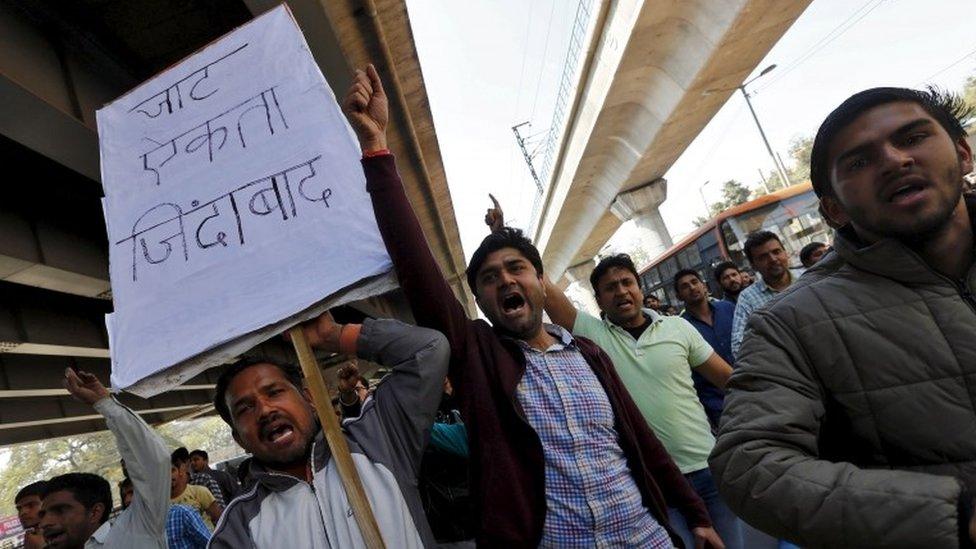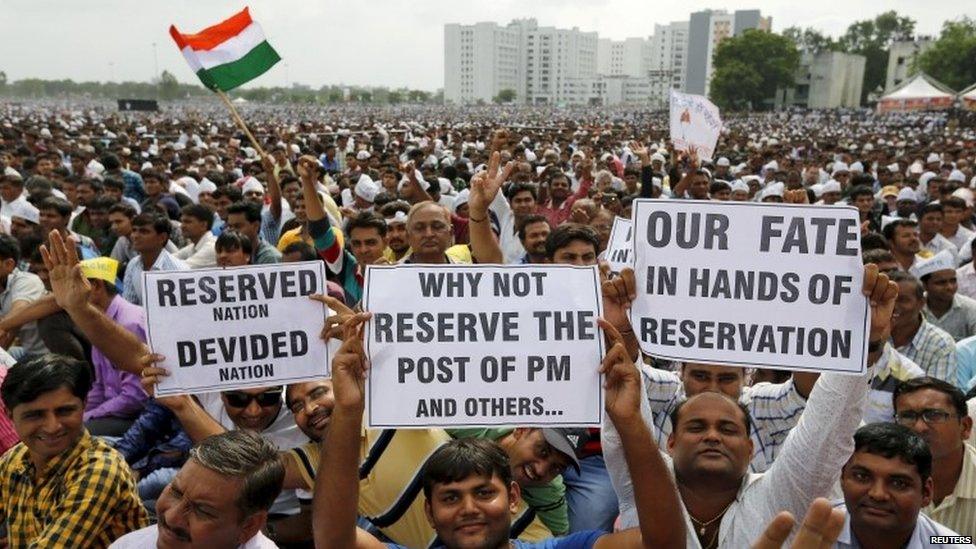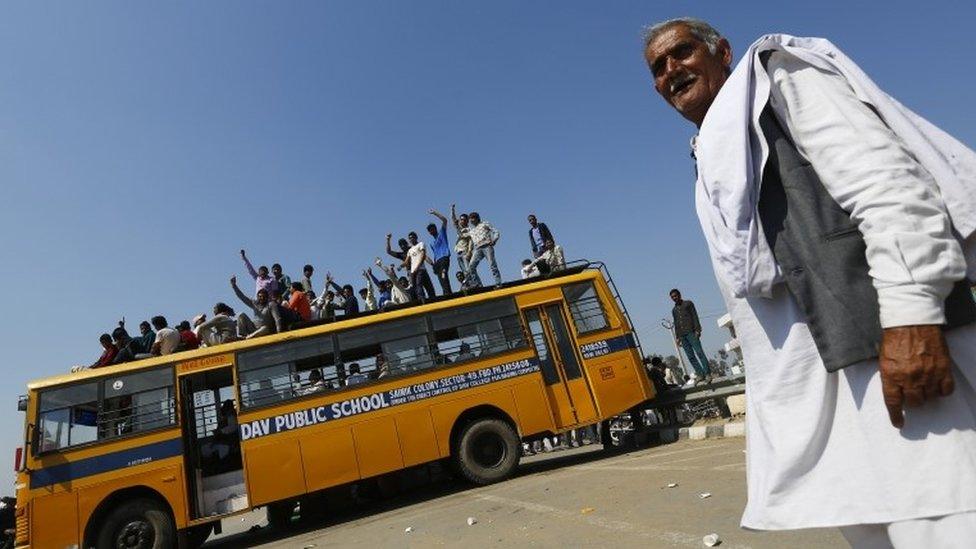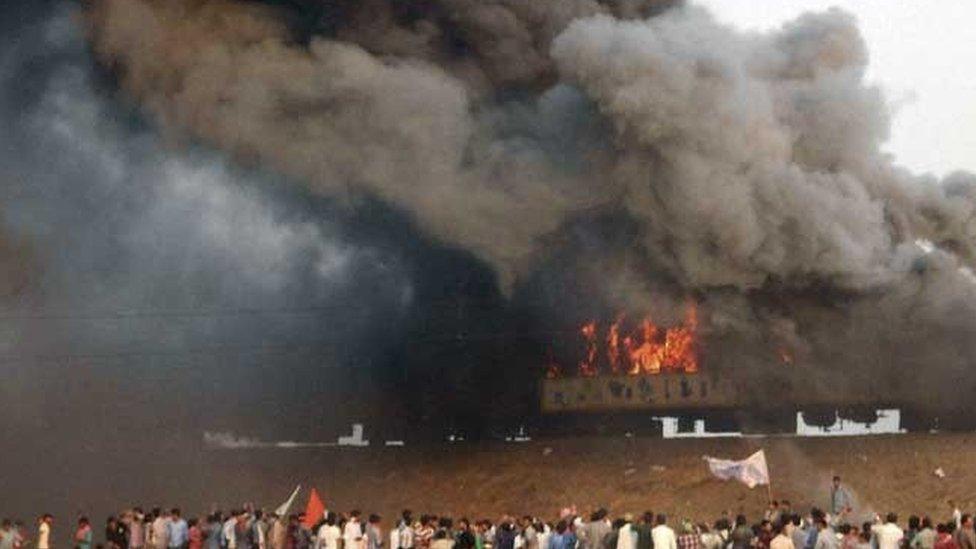Caste unrest: Why India's farm communities are angry
- Published

Demonstrators from the Jat community shout slogans during a protest in Delhi
Why are some of India's major farming communities in ferment?
In recent days at least 16 people have been killed in violent protests by the Jat community in the state of Haryana. They are demanding the reinstatement of caste quotas for government jobs and education places.
The land-owning and relatively affluent community makes up 27% of the voters in the northern state and dominates in a third of 90 assembly seats.
Last year, the Supreme Court turned down quotas for Jats in nine states, including Haryana, saying they did not belong to a backward community.
In western India's Gujarat, the native state of Prime Minister Narendra Modi, an upstart leader from the 15 million-strong Patel community led huge protests last year, demanding quotas in government jobs for his community, despite their relative prosperity. Hardik Patel is now in prison, battling charges of sedition.
And down south in Andhra Pradesh, a violent agitation by the Kapu community, again seeking backward caste quotas, has spread to 13 districts - the community makes up some 26% of the state's 50 million people.
Caste can 'neither be ducked or dodged'
All the three communities are demanding they should be categorised as what India's complex terminology of castes defines as Other Backward Classes (OBCs).
They are placed between the traditional upper castes and the lowest. Two surveys have estimated that OBCs make up anything between 41-52% of India's population.
Like race in America, says sociologist Dipankar Gupta, caste in India can "neither be ducked or dodged".
Caste constitutes the primordial identity of the citizen and has spawned a complex social order which assigned people a place in the social hierarchy based on their occupation.
It has also turned out to be the most regressive feature of India's social system, perpetuating a hideously hierarchical social order which sanctioned repression of the lower castes by the privileged upper castes.

Some 300,000 members of the Patel community attended the meeting in Ahmedabad last year
In 1950, the federal government announced seat reservations in educational institutions and government to the scheduled castes and tribes, the lowest in the caste hierarchy, to correct historical injustices.
Much later, in 1989, quotas were extended to lower castes in education and government jobs - 27% of all educational seats and government jobs were reserved for the OBCs.
This was, according to Dr Gupta, the beginning of large-scale caste politics.
"This is how the clock was steadily being turned back," he says.
The battle to be 'backward'
As with almost everything in India, the opening up of caste politics was a mixed blessing.
In many ways it eased the social stranglehold of the upper castes and deepened democracy: the latest parliament, for example, has MPs from more than 35 parties, many of them regional and birthed in the battle for empowerment of castes.
But a controversial and tricky methodology for deciding whether a community would be eligible for backward status ended up, believe academics like Dr Gupta, "carefully shielding the OBCs who are educationally and economically well-endowed".

Jats are a politically influential community
What was originally intended to be temporary move in affirmative action to provide a level playing field to unprivileged communities has now become a vote-catching ploy for India's politicians.
No wonder there are more than 5,000 castes who officially count themselves as OBCs today.
"At election time, politicians now promised, in the name of equality, to extend the proportion of reserved places, and to make them available to newly defined 'backward caste' categories," writes Sunil Khilnani in his seminal book The Idea of India.
"Caste groups, meanwhile in a curious inversion of the ideal of social mobility, competed to be defined as 'backward' in order to corner the benefits of reservation."
Farming under pressure
But there are other factors in the recent caste mutinies.
The uprisings are also linked to declining farm incomes and lack of private sector jobs across India.
Two years of drought and lack of irrigation has led to large scale migration from the farms to the cities in search of unskilled urban jobs.
The largely jobless growth that India is experiencing means many of the communities are not able to get work in the cities as well.

A train was set on fire by protesters belonging to the Kapu community earlier this month
In these difficult times, these communities who, according to Professor Khilnani, "exist in the homeless world of modern politics", are desperately looking for a secure government job which will bring a regular income and make them eligible grooms in the dowry-driven marriage market.
"I missed the civil services exam by one mark last year. If I had reservation [quota], I would have got through," Om Prakash, an agitating Jat student, told a newspaper at the weekend.
The chequered story of the declining fortunes of India's relatively affluent farming communities is one of political betrayal, and of a struggle against the forces of globalisation.
Strident identity politics, pursued by politicians and others to extract concessions from a weak state, can only help perpetuate the scourge of caste, which the quotas sought to end in the first place.
More troubling is the withering away of any imagination to initiate a new conversation on quotas and the apparent ineptness of India's political class, as the latest incident in a BJP-ruled state shows, at dousing these mutinies.